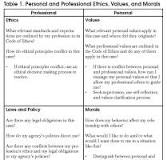The Dilemma in Ethics: Navigating Moral Complexity
Ethical dilemmas are inherent in the fabric of human existence, presenting individuals with complex choices that can challenge their moral compass. These dilemmas often arise when one is faced with conflicting moral principles or values, making it difficult to determine the right course of action.
One common ethical dilemma is the classic “trolley problem,” where a person must decide whether to divert a runaway trolley onto a track where it will harm fewer people but still cause harm, or do nothing and allow it to continue on its current path, resulting in more casualties. This thought experiment forces individuals to grapple with the concept of utilitarianism versus deontological ethics: should one prioritize the greater good or adhere strictly to moral rules?
Another prevalent ethical dilemma revolves around the issue of honesty versus loyalty. For instance, an employee may face a situation where reporting a colleague’s unethical behavior could lead to their dismissal, potentially jeopardizing their own job security. In this scenario, one must weigh the value of honesty against loyalty and personal consequences.
Furthermore, advancements in technology have introduced new ethical dilemmas, such as data privacy concerns and artificial intelligence ethics. Questions surrounding the use of personal data for targeted advertising or the development of autonomous weapons raise significant ethical considerations that society must address.
When confronted with ethical dilemmas, individuals often experience inner turmoil as they navigate conflicting values and potential consequences. It requires careful reflection, critical thinking, and a deep understanding of ethical theories to make informed decisions that align with one’s values and principles.
In conclusion, ethical dilemmas are an intrinsic part of human decision-making processes, challenging individuals to uphold moral integrity in complex situations. By engaging in thoughtful discourse and ethical reasoning, we can strive to navigate these dilemmas with wisdom and compassion.
5 Essential Tips for Navigating Ethical Dilemmas
- Consider all stakeholders involved in the dilemma.
- Reflect on your personal values and beliefs to guide your decision-making.
- Seek advice from trusted mentors or ethical experts.
- Evaluate the potential consequences of each possible decision.
- Be open to revisiting and reassessing your ethical choices as new information arises.
Consider all stakeholders involved in the dilemma.
When facing a dilemma in ethics, it is crucial to consider all stakeholders involved in the situation. Each stakeholder may have different perspectives, interests, and values that could be impacted by the decision made. By taking into account the concerns of all parties affected, one can strive to make a more informed and ethical choice that considers the broader implications of their actions. This approach promotes fairness, empathy, and a holistic understanding of the ethical dilemma at hand.
Reflect on your personal values and beliefs to guide your decision-making.
When facing a dilemma in ethics, it is crucial to reflect on your personal values and beliefs as a guiding compass for decision-making. By examining what truly matters to you and aligning your actions with your core principles, you can approach ethical dilemmas with clarity and integrity. Understanding the moral foundation that shapes your worldview allows you to make choices that resonate with your authentic self, fostering a sense of coherence and ethical consistency in navigating complex situations.
Seek advice from trusted mentors or ethical experts.
When facing a dilemma in ethics, it is advisable to seek advice from trusted mentors or ethical experts. Consulting with individuals who have experience navigating complex moral issues can provide valuable insights and perspectives that may help clarify the situation. By engaging with mentors or experts who uphold high ethical standards, one can benefit from their wisdom and guidance in making informed and morally sound decisions. Their guidance can offer a fresh outlook on the dilemma, enabling one to consider different angles and potential consequences before reaching a resolution.
Evaluate the potential consequences of each possible decision.
When faced with an ethical dilemma, it is crucial to evaluate the potential consequences of each possible decision. By carefully considering the outcomes of various choices, individuals can assess the impact on stakeholders, society, and themselves. Understanding the short-term and long-term effects of each option allows for a more informed decision-making process that takes into account ethical principles and values. This thoughtful consideration of consequences helps individuals navigate complex moral situations with greater clarity and integrity.
Be open to revisiting and reassessing your ethical choices as new information arises.
It is crucial to be open to revisiting and reassessing your ethical choices as new information arises. Ethical dilemmas are often dynamic and multifaceted, requiring a willingness to adapt and reconsider decisions in light of evolving circumstances. By remaining open-minded and receptive to new insights, individuals can demonstrate a commitment to ethical growth and integrity, ensuring that their actions align with their values and principles in an ever-changing world.



